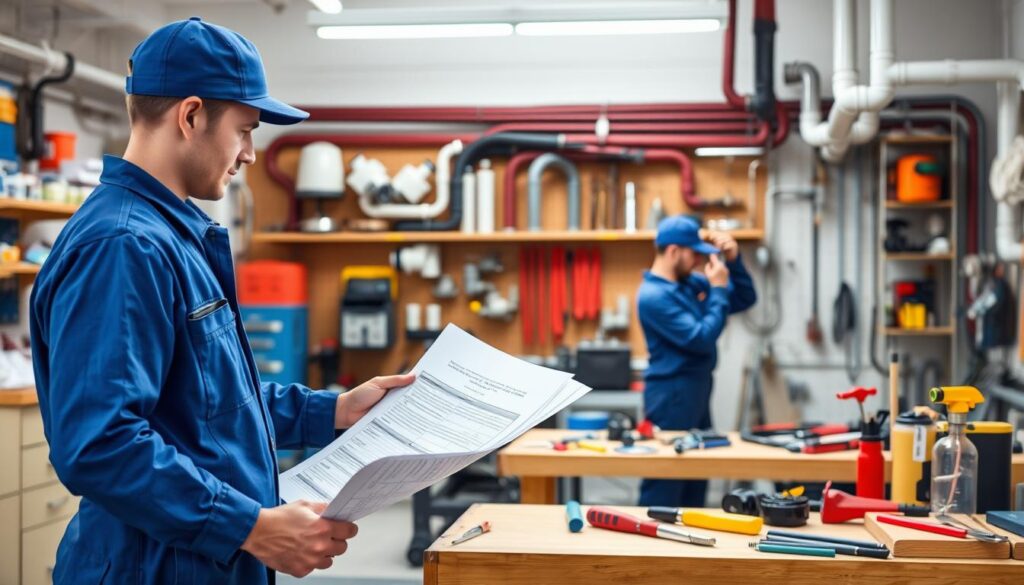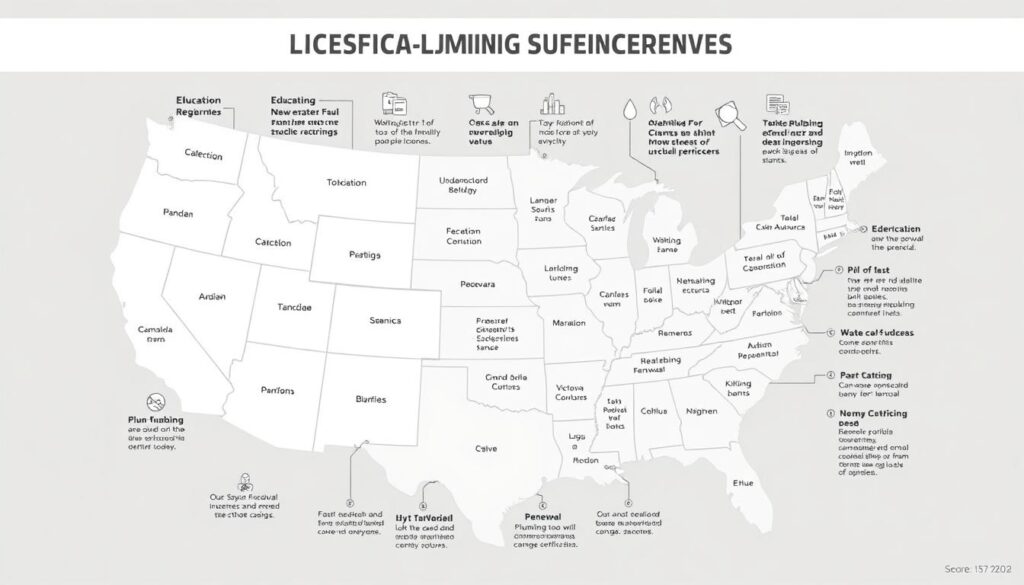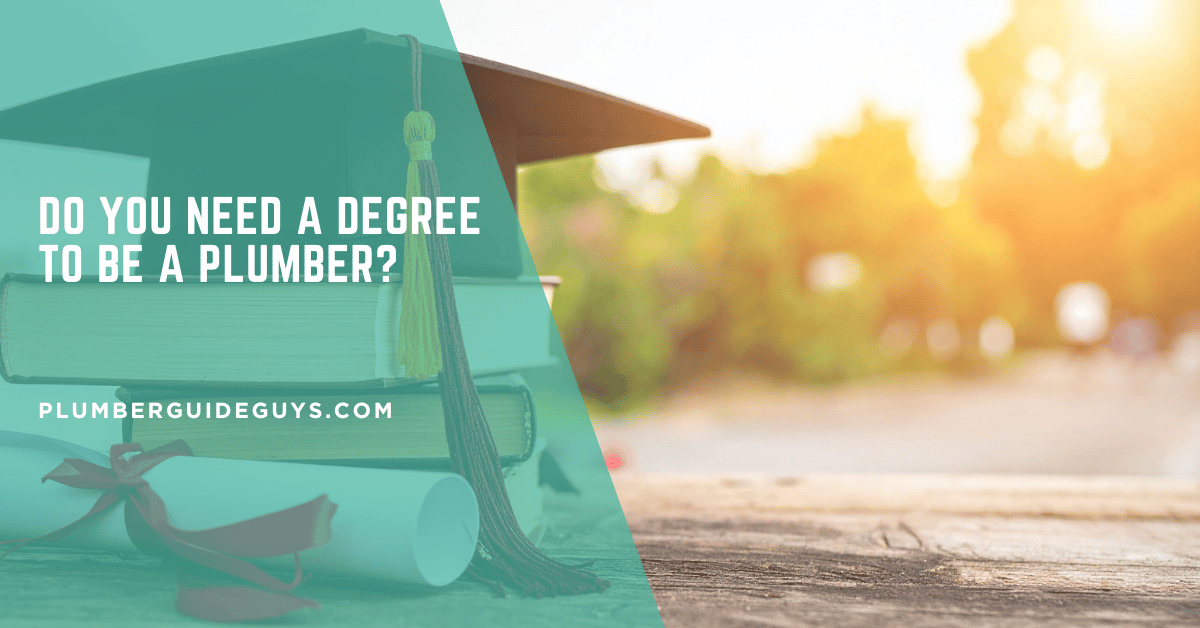Affiliate Disclosure
Plumber Guide Guys is a participant in the Amazon Services LLC Associates Program, an affiliate advertising program designed to provide a means for sites to earn advertising fees by advertising and linking to Amazon.
Do You Need a Degree to Become a Plumber? Are you thinking if college is the only way to a good job? Plumbing might change your mind. You can start a plumbing career without a degree, learning a valuable trade.

Do you need a degree to be a plumber? No, you don’t. Plumbing focuses on skills you can learn by doing, not just studying. It’s a great choice for those who learn better by doing.
This guide will show you how to become a plumber. You’ll learn about apprenticeships, vocational training, and special certifications. These paths can lead to a fulfilling career in plumbing.
Key Takeaways
- Plumbing careers do not require a traditional college degree
- Apprenticeship programs are the primary pathway to becoming a plumber
- Practical skills and certifications matter more than academic credentials
- Plumbing offers competitive wages and job stability
- Multiple routes exist to enter the plumbing profession
Table of Contents
Understanding the Basic Requirements for Plumbing Careers
Starting a plumbing career is more than just knowing how to fix pipes. It involves several key steps that prepare you for this trade. Knowing what you need to get started will help you on your path to becoming a plumber.
Educational Prerequisites
Your journey in plumbing begins with a good education. Most places want you to have:
- High school diploma or equivalent GED
- Basic math and algebra skills
- Understanding of physics and geometry
“Success in plumbing is built on a strong educational groundwork” – Professional Plumbers Association
Physical Requirements and Essential Skills
Plumbing is hard work that needs certain qualities. Your success depends on:
- Being in great physical shape
- Having strong hands
- Being good at solving problems
- Understanding machines
Age and Legal Requirements
To work in plumbing, you must meet legal rules:
- Be at least 18 years old
- Have a clean record
- Have a valid driver’s license
- Pass a physical test
Even though a college degree isn’t needed, your dedication to learning and getting better at plumbing is key to success.
Do You Need a Degree to Be a Plumber?
Are you wondering if a degree is needed to become a plumber? The answer is no. Plumbing certification doesn’t require a college degree. Instead, there are other ways to start your plumbing career.
Plumbing is a trade that emphasizes practical skills and hands-on learning. You don’t need a college degree to become a plumber. But, you must complete certain educational steps:
- High school diploma or GED
- Vocational training program
- Apprenticeship program
- Industry-recognized certifications
The main way to become a plumber is through an apprenticeship. These programs last 4-5 years. They mix classroom learning with real-world training. You’ll learn from experienced plumbers.
Technical schools and community colleges also offer plumbing programs. These programs teach the basics. You’ll learn about:
- Plumbing system designs
- Building codes and regulations
- Safety protocols
- Technical drawing and mathematics
Even though a college degree isn’t needed, keeping your skills sharp is important. State licensing boards require specific training and exams to become certified.
The Path to Becoming a Licensed Plumber
To become a licensed plumber, you need a plan that’s more than just school. Your path will mix hands-on training, classroom learning, and getting certified.
Pre-Apprenticeship Preparation
Before starting an apprenticeship, there are steps to take. Many future plumbers start with pre-apprenticeship programs. These programs help build the basics.
- Complete high school or obtain a GED
- Take vocational courses in mathematics and physics
- Develop basic mechanical and technical skills
- Research local apprenticeship opportunities
Apprenticeship Training Structure
Apprenticeships differ from college. They offer real-world training and a salary. This is a unique way to learn.
- Typical apprenticeship duration: 4-5 years
- Combines on-the-job training with classroom instruction
- Earn while you learn professional skills
- Supervised by experienced master plumbers
Certification Process
To get licensed, you must pass state exams. Each state has its own rules, but the process is similar.
Getting certified means showing you know the technical stuff, can do the job, and know the local codes. Once you pass, you can work as a pro plumber.
Trade School vs. Traditional College Education
Choosing the right path for a plumbing career is key to your future. Trade schools for plumbers offer focused learning that’s different from college. They provide specialized training without the need for a four-year degree, saving time and money.
- Duration of training
- Cost of education
- Practical skill development
- Career readiness
Trade schools have a more focused curriculum, preparing you for the workforce sooner. You learn through hands-on training, workshops, and supervised experiences. This prepares you for real-world plumbing jobs.
| Educational Path | Training Duration | Average Cost | Career Readiness |
|---|---|---|---|
| Trade School | 6-24 months | $10,000 – $25,000 | High |
| Traditional College | 4 years | $40,000 – $120,000 | Low to Moderate |
Trade school programs let you start your plumbing career quickly. They focus on technical skills, industry standards, and apprenticeships. This leads to successful careers.
Trade schools provide a direct route to becoming a skilled professional with minimal financial investment and faster career launch.
Choosing a targeted education means less debt, more practical experience, and a quicker start to your plumbing career. It’s a smarter way to begin your professional journey.
Apprenticeship Program Components and Duration
Plumbing apprenticeship programs offer a hands-on way to learn plumbing skills. They are a practical choice instead of going to college. These programs mix on-the-job training with classroom learning, giving you a well-rounded education.
Choosing an apprenticeship over college means you learn by doing. You get real-world experience and earn money while you learn. This makes it a great choice for those who want to start their career quickly.
On-the-Job Training Hours
Apprenticeships usually last 4-5 years and include about 2,000 hours of on-the-job training. You’ll work with experienced plumbers. You’ll learn important skills and safety rules.
- Hands-on installation practices
- Pipe fitting and repair techniques
- Equipment maintenance
- Customer service skills
Classroom Instruction Requirements
Along with practical training, you’ll also take 144 classroom hours each year. These classes teach you the theory you need to know. You’ll learn about:
- Plumbing codes and regulations
- Blueprint reading
- Mathematics for plumbing calculations
- Safety standards
Skills Development Timeline
Your skills will grow over the 4-5 year apprenticeship. Each year, you’ll take on more complex tasks and responsibilities.
By the end, you’ll be a skilled plumber. You’ll be ready to handle tough plumbing jobs with confidence.
Certification and Licensing Requirements by State

To become a licensed plumber, you must follow state rules. Each state has its own set of rules for plumbing certification. It’s important to know and meet these requirements.
Getting a plumbing license involves several key steps:
- Passing a state-specific licensing exam
- Completing required apprenticeship hours
- Showing practical work experience
- Keeping up with ongoing professional education
While a college degree is not required, most states need a mix of classroom learning and real-world experience. The exact time and details can differ a lot from one place to another.
| State | Apprenticeship Hours | Exam Requirement | Renewal Frequency |
|---|---|---|---|
| California | 8,000 hours | Required | Every 3 years |
| Texas | 7,500 hours | Required | Every 2 years |
| New York | 8,000 hours | Required | Every 3 years |
It’s vital to check your state’s plumbing certification rules to follow them. Local licensing boards offer the latest info on becoming a licensed plumber in your area.
Pro tip: Always check the latest rules with your state’s licensing department. Laws can change often.
Career Advancement Opportunities in Plumbing
Plumbing offers exciting career paths for those willing to invest in their professional growth. You can move from apprentice to journeyman plumber and then to master plumber. This opens up many opportunities in the industry.
Your journey in plumbing can take many rewarding directions. Knowing the journeyman plumber qualifications is key for career growth. These qualifications include:
- Completing a thorough apprenticeship program
- Passing state-specific licensing exams
- Gaining a lot of work experience
- Showing technical skill
Journey to Master Plumber
Master plumber training is the top achievement in plumbing. To get there, you’ll need:
- At least 5-7 years of practical experience
- Deep technical knowledge
- Passing tough certification exams
- Skills in complex plumbing systems
Specialization Options
Plumbing has many specialization paths, including:
- Residential plumbing
- Commercial plumbing
- Industrial pipe systems
- Green technology installations
Business Ownership Possibilities
Experienced plumbers can start their own businesses. With good master plumber training and a business mindset, you can start a successful plumbing company. You can serve both residential and commercial clients.
“Success in plumbing is about continuous learning and adapting to new technologies and market needs.” – Professional Plumbing Association
Salary and Job Market Outlook

Starting a plumbing career without a degree can lead to great financial rewards and job security. It’s a solid choice for those looking for stable work without college.
Plumbers in the U.S. can earn competitive salaries that rise with experience. Beginners start at about $35,000 a year. More experienced plumbers can make $60,000 to $85,000 annually.
- Entry-level plumber salary: $35,000 – $45,000
- Mid-career plumber salary: $50,000 – $70,000
- Experienced master plumber salary: $75,000 – $100,000
The job outlook for plumbers is strong, with a 5% growth rate by 2030. This growth is due to ongoing repairs, new buildings, and retiring plumbers.
Plumbing offers a unique chance to build a successful career without student loan debt.
There are many ways to advance in plumbing. You can move from apprentice to journeyman, then to master plumber. Starting your own plumbing business is also an option. Specializing in different areas can boost your earnings.
Investing in plumbing skills is a smart move for financial stability and career growth. It’s a practical and fulfilling career choice.
Conclusion
Becoming a licensed plumber is an exciting career choice that doesn’t need a college degree. Your path to success is filled with practical skills, hands-on training, and certifications. If you’re wondering if you need a degree to be a plumber, the answer is no. Professional training and apprenticeships are the keys to success.
The journey to becoming a licensed plumber has many benefits over traditional college paths. You’ll start working sooner, earn while you learn, and avoid big student loans. Professional plumbing training gives you skills that are always needed in many industries and places.
Your career can grow beyond just starting out. With a commitment to learning and improving, you can move up to specialized roles, start your own business, or become a master plumber. The plumbing trade offers stability, good pay, and chances for growth that many jobs can’t match.
Keep in mind that each state has its own rules for licenses, so make sure to check local laws. Your hard work, willingness to learn, and technical skills will determine your success in this rewarding field. The plumbing industry welcomes those ready to build a strong, fulfilling career with their own hands.
FAQ
Is a college degree required to become a plumber?
How long does it take to become a licensed plumber?
What are the educational requirements to start a plumbing career?
How much does plumbing training cost compared to a college degree?
Is a college degree required to become a plumber?
How long does it take to become a licensed plumber?
What are the educational requirements to start a plumbing career?
How much does plumbing training cost compared to a college degree?
FAQ
Is a college degree required to become a plumber?
No, you don’t need a college degree to be a plumber. You’ll need to do an apprenticeship, get hands-on experience, and get the right certifications and licenses for your state.
How long does it take to become a licensed plumber?
It usually takes 4-5 years to become a licensed plumber. This includes 4-5 years of apprenticeship, on-the-job experience, and classroom learning. The exact time can vary based on your state’s rules.
What are the educational requirements to start a plumbing career?
You need a high school diploma or GED to start. While a college degree isn’t needed, good math and science skills are helpful. Many start with vocational training or pre-apprenticeship programs to learn the basics.
How much does plumbing training cost compared to a college degree?
Plumbing training is much cheaper than college. Apprenticeships cost between
FAQ
Is a college degree required to become a plumber?
No, you don’t need a college degree to be a plumber. You’ll need to do an apprenticeship, get hands-on experience, and get the right certifications and licenses for your state.
How long does it take to become a licensed plumber?
It usually takes 4-5 years to become a licensed plumber. This includes 4-5 years of apprenticeship, on-the-job experience, and classroom learning. The exact time can vary based on your state’s rules.
What are the educational requirements to start a plumbing career?
You need a high school diploma or GED to start. While a college degree isn’t needed, good math and science skills are helpful. Many start with vocational training or pre-apprenticeship programs to learn the basics.
How much does plumbing training cost compared to a college degree?
Plumbing training is much cheaper than college. Apprenticeships cost between $1,000 to $5,000, while college degrees can be over $40,000. Plus, you earn while you learn during your apprenticeship.
What physical skills do I need to become a plumber?
Plumbers need good hand-eye coordination, stamina, problem-solving skills, and can work in different places. You should be okay with hard work, tight spaces, and using tools and equipment.
Can I become a plumber if I’m older or changing careers?
Yes, plumbing welcomes people of all ages and backgrounds. You must be at least 18 with a high school diploma. Many people switch to plumbing as a second or mid-career choice.
What are the career advancement opportunities in plumbing?
Plumbing has many career paths. You can move from apprentice to journeyman to master plumber. You can also specialize in different areas or start your own business as you gain experience.
How much can I expect to earn as a plumber?
Plumbers earn good wages, with a median of $56,330 a year as of 2021. Experienced plumbers, or those in their own businesses, can make over $97,000 annually.
Do plumbing requirements differ by state?
Yes, each state has its own rules for plumbing. While no state requires a college degree, they all have specific apprenticeship hours, exams, and continuing education needs. It’s important to check your state’s rules for becoming a licensed plumber.
What are the job prospects for plumbers?
The job market for plumbers is growing, with a 5% increase expected from 2020 to 2030. The need for new buildings, maintenance, and repairs means plumbers are always in demand across the U.S.
,000 to ,000, while college degrees can be over ,000. Plus, you earn while you learn during your apprenticeship.
What physical skills do I need to become a plumber?
Plumbers need good hand-eye coordination, stamina, problem-solving skills, and can work in different places. You should be okay with hard work, tight spaces, and using tools and equipment.
Can I become a plumber if I’m older or changing careers?
Yes, plumbing welcomes people of all ages and backgrounds. You must be at least 18 with a high school diploma. Many people switch to plumbing as a second or mid-career choice.
What are the career advancement opportunities in plumbing?
Plumbing has many career paths. You can move from apprentice to journeyman to master plumber. You can also specialize in different areas or start your own business as you gain experience.
How much can I expect to earn as a plumber?
Plumbers earn good wages, with a median of ,330 a year as of 2021. Experienced plumbers, or those in their own businesses, can make over ,000 annually.
Do plumbing requirements differ by state?
Yes, each state has its own rules for plumbing. While no state requires a college degree, they all have specific apprenticeship hours, exams, and continuing education needs. It’s important to check your state’s rules for becoming a licensed plumber.
What are the job prospects for plumbers?
The job market for plumbers is growing, with a 5% increase expected from 2020 to 2030. The need for new buildings, maintenance, and repairs means plumbers are always in demand across the U.S.

